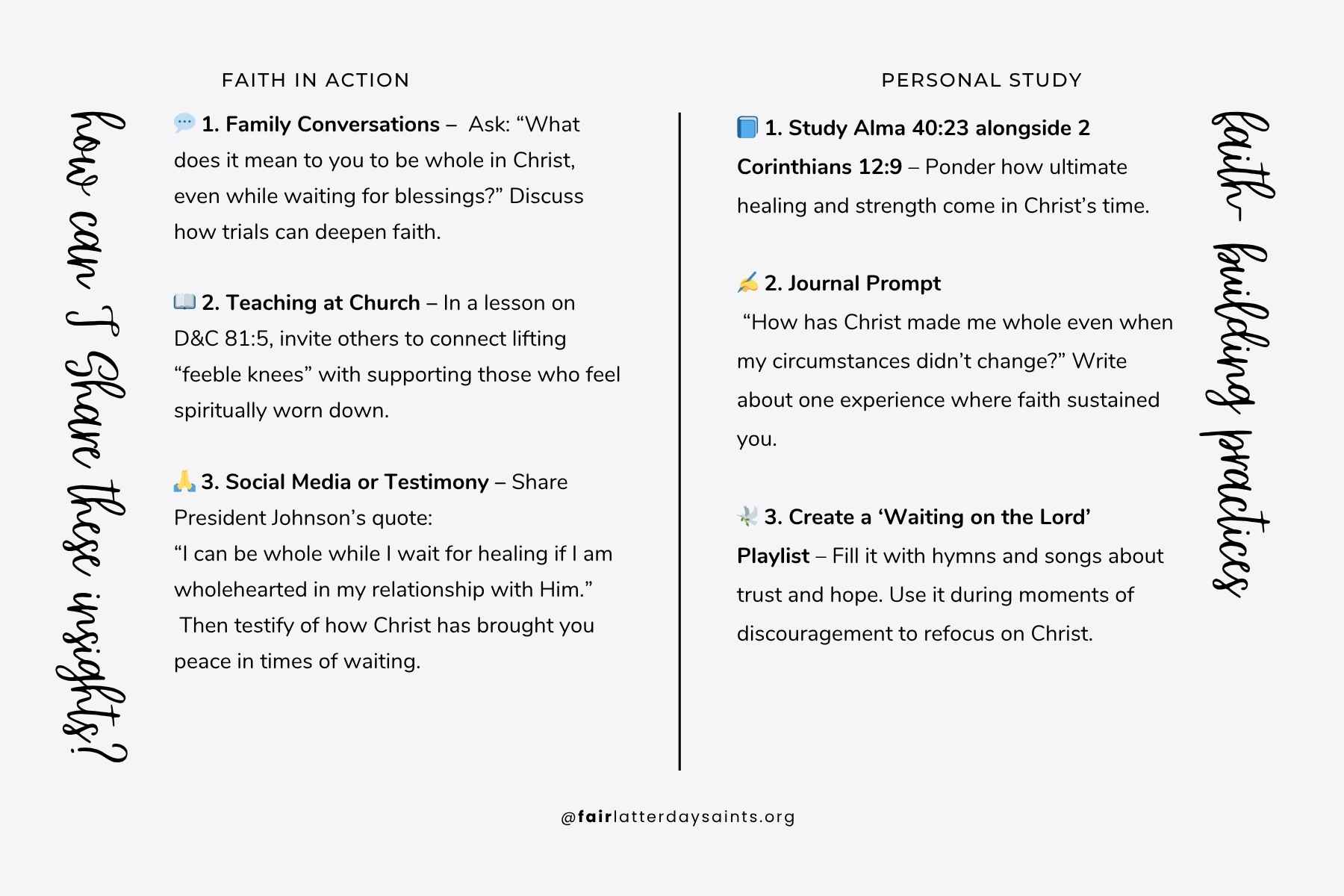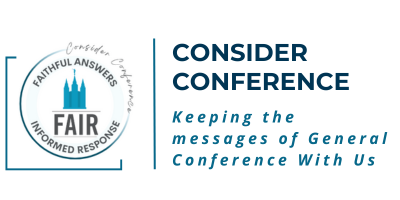
Finding Wholeness While Waiting for Healing
I think we have all wondered why God doesn’t heal every pain, fix every struggle, or resolve every heartache right now—especially for those who earnestly follow Him. Watching my parents, family members and children go through so many difficulties has taught me just how much we all long for relief—for miracles.
Through these challenges, I’ve begun to learn something life-changing: wholeness isn’t about a life free of trials. It’s about a heart full of Christ. Illness or death doesn’t mean God’s disfavor. Trials—if we let them—can bring us closer to Him, not farther away.
In her General Conference message Spiritually Whole in Him, President Camille N. Johnson reminds us of this truth. She teaches that while physical and emotional healing may come later—in the Lord’s time—we can be made spiritually whole now through faith, repentance, and covenant connection with Jesus Christ.
“I can be whole while I wait for healing if I am wholehearted in my relationship with Him.”
As we study Doctrine and Covenants 81–83, President Johnson’s message resonates powerfully with the Lord’s invitation to “succor the weak, lift up the hands which hang down, and strengthen the feeble knees” (D&C 81:5). Both remind us that God’s timing doesn’t diminish His love—and His wholeness is available even in the waiting.
What does it mean to you to be spiritually whole in the middle of unanswered prayers? And how can trusting Christ’s timing bring peace when the healing you long for hasn’t yet come?
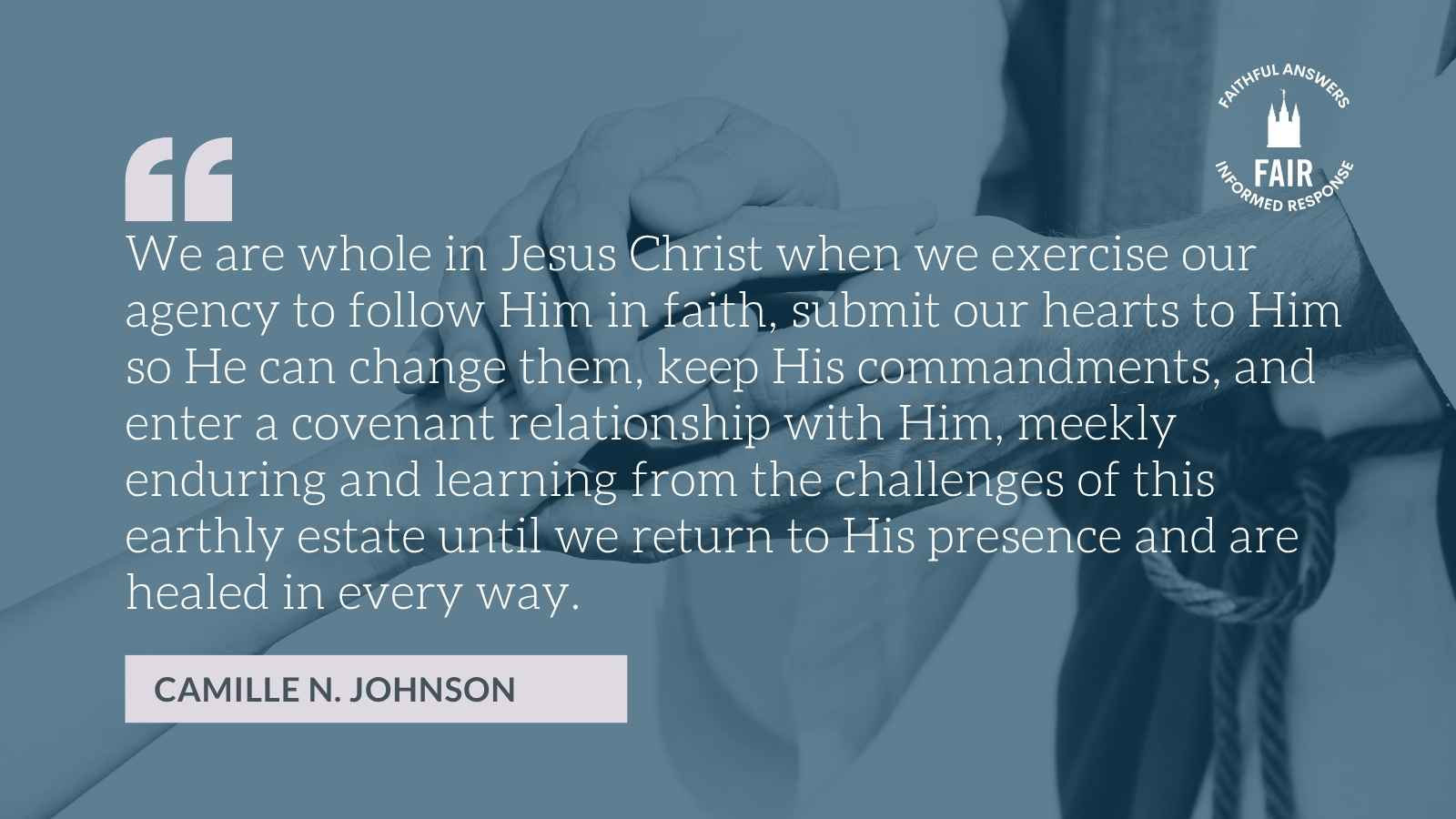
Apologetic Issues: Healing, Wholeness & God’s Timing
Criticism: If God is truly loving and all-powerful, why does He allow faithful people to suffer from chronic illness, depression, or even death? Shouldn’t faith guarantee healing?
Response: God’s love does not shield us from every trial in mortality. As President Camille N. Johnson teaches, “Wholeness does not necessarily mean physical and emotional restoration in this life. Wholeness is born of faith in and conversion to Jesus Christ.”
The scriptures are clear that ultimate healing—physical and emotional—comes through the Resurrection (Alma 40:23). In the meantime, faith in Christ can make us spiritually whole even when mortal struggles remain unresolved. Trials don’t prove that God is absent. Rather, trials can deepen our reliance on Him and prepare us for His promised restoration.
Common Fallacy: False Dilemma – A false dilemma (or false dichotomy) occurs when only two options are presented as if they are the only possibilities, ignoring other reasonable alternatives. Some argue: “If God is loving and all-powerful, He must heal every affliction immediately. If He doesn’t, then He must not be loving or even real.” This reasoning creates a false dilemma by assuming there are only two possibilities:
1⃣ God removes all pain now, or
2⃣ God is unloving or absent.
This oversimplifies the doctrine of God’s plan. Mortality is designed as a time for growth, testing, and learning faith. Healing comes in His time—spiritual healing now, physical and emotional healing in the Resurrection.
Solution: Recognizing that God’s love is expressed through sustaining grace in trials, not just the removal of trials, resolves this false dilemma and reinforces trust in His perfect timing.
Social Issue: Trials mean God is displeased with me
Misconception: “If I’m struggling with sickness, loss, or unanswered prayers, maybe God is punishing me or I’ve lost His favor.”
Response: God allows trials not as punishment but as opportunities to draw nearer to Christ, to experience His grace, and to grow in spiritual strength. The Apostle Paul’s “thorn in the flesh” (2 Corinthians 12:7–10) reminds us that God’s power is made perfect in our weakness, and joy can be found even amid struggle.
Common Fallacy: Post Hoc Ergo Propter Hoc – (“after this, therefore because of this”) is a logical fallacy that assumes that if one event follows another, the first must have caused the second. Some assume: “Because trials came after my sin or weakness, they must be God’s punishment for it.” This reasoning commits the Post Hoc fallacy by connecting two events (sin → trial) as cause and effect without considering other explanations.
Correction: Not all suffering is the result of sin. The scriptures teach that trials are part of mortality and can refine even the righteous (Mosiah 23:21–22). Christ’s grace is not about sparing us from hardship but transforming us through it. Recognizing that difficulties can sanctify rather than condemn helps us avoid blaming God or ourselves unnecessarily.
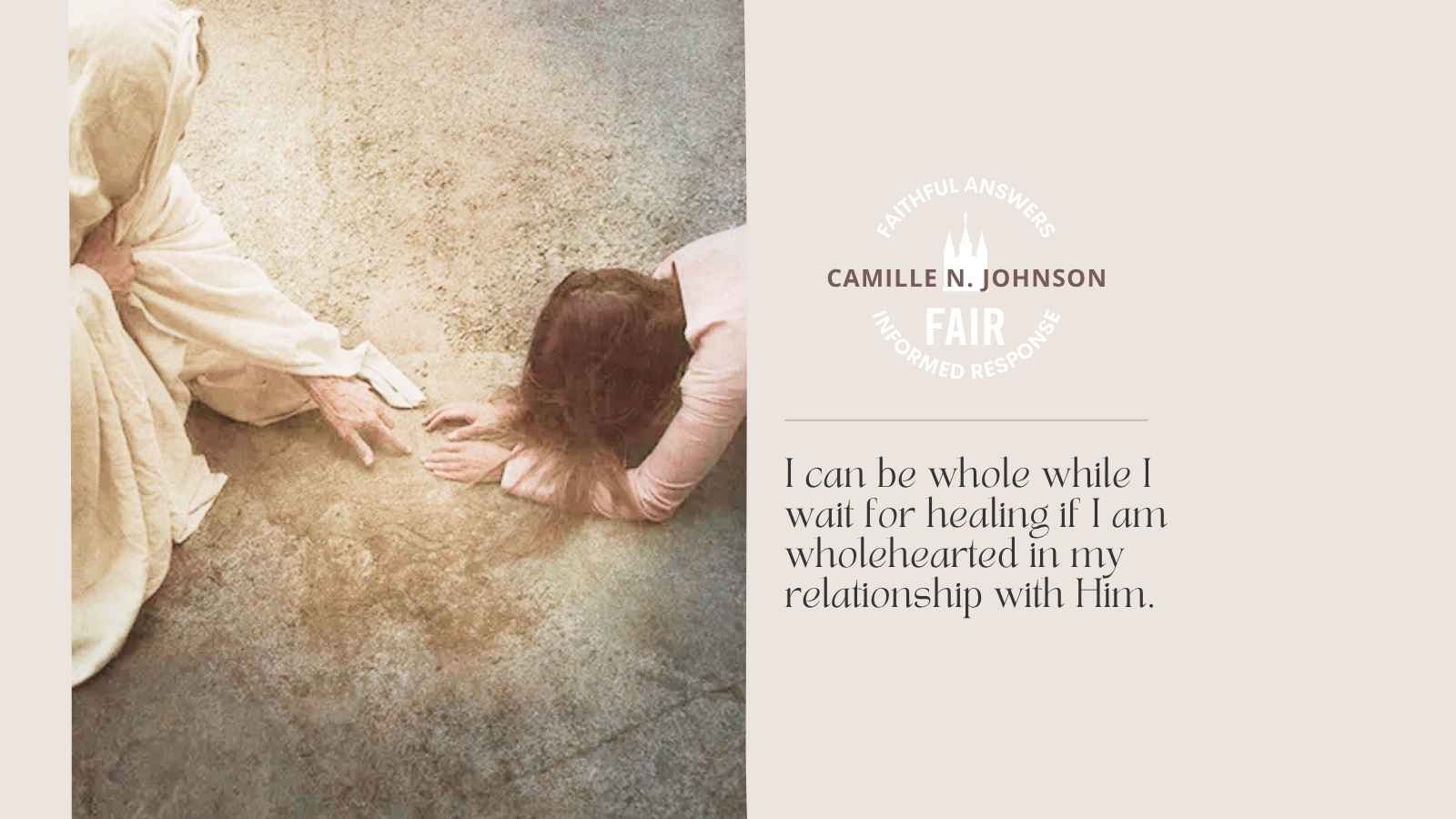
Apologetic Application: Wholeness Through Christ’s Atonement Requires Faith and Covenant
President Camille N. Johnson’s message reveals a doctrine with profound apologetic value: wholeness is not about perfect circumstances—it’s about perfect reliance on Jesus Christ. This perspective shifts the focus from expecting life to be free of pain to trusting that Christ can bring peace, strength, and purpose even in the midst of trials. At the heart of her message lies a doctrinal triad that helps us understand how Christ makes us whole.
Through the Atonement of Jesus Christ, we are healed from sin and strengthened to endure life’s challenges with faith (Alma 7:11–13). His grace is sufficient to sustain us, even when our outward circumstances do not immediately change. And covenants deepen our conversion, anchoring us to Him and filling our “lamps with oil” as we prepare to meet the Bridegroom and experience ultimate wholeness (D&C 81:5; Matthew 25:1–13).
As President Johnson beautifully reminds us, “Wholeness does not necessarily mean physical and emotional restoration in this life. Wholeness is born of faith in and conversion to Jesus Christ.”
Defending Core Beliefs
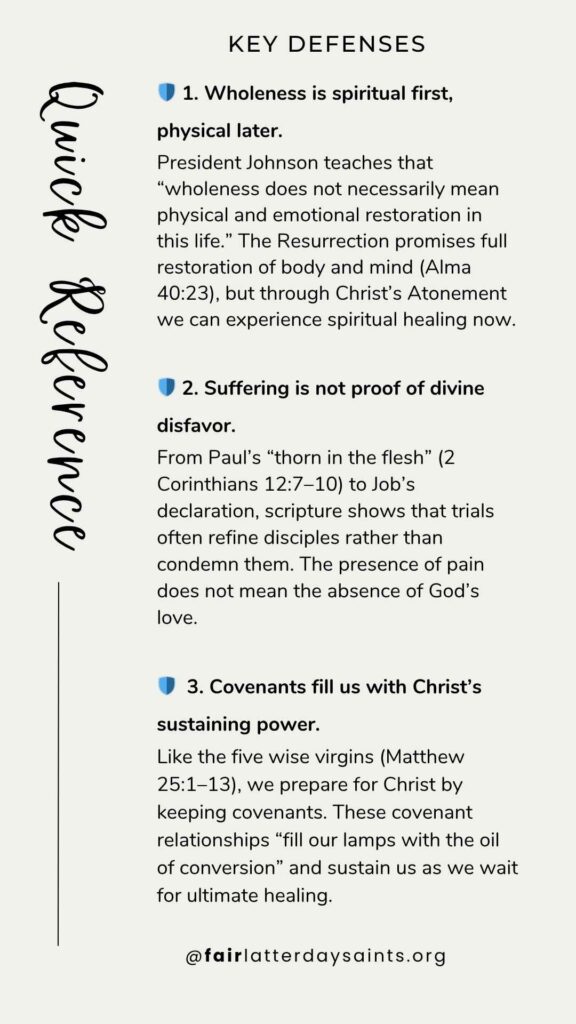 1⃣ Healing ≠ Proof of God’s Favor
1⃣ Healing ≠ Proof of God’s Favor
Some critics argue that illness or ongoing struggle means either “God doesn’t love you” or “faith doesn’t work.” But Latter-day Saint doctrine refutes this. Christ’s grace doesn’t eliminate all trials—it transforms us within them. The Apostle Paul gloried in his “thorn in the flesh” because it taught him that “when I am weak, then am I strong” (2 Corinthians 12:10).
Wholeness is spiritual first, physical later.
2⃣ God’s Love Is Redemptive, Not Transactional
Another misconception is that blessings and healing are rewards for “being righteous enough.” President Johnson counters this:
“I can be whole while I wait for healing if I am wholehearted in my relationship with Him.”
Faith is not a lever to control God—it’s a covenantal relationship that sustains us through trials and draws us to Christ. Christ’s Atonement isn’t conditional on our perfection. It’s extended to all who will come unto Him.
Practical Apologetic Use
When someone says: “If God really cared about people, He wouldn’t let them suffer like this” or “Faith is useless if it doesn’t fix your problems,” you can respond with this principle:
“Faith in Christ isn’t about having a life free from pain—it’s about having Christ in the middle of the pain. His Atonement can bring peace and strength now, and His Resurrection assures full healing later.”
This answer does two things:
- It reframes the conversation so God’s timing and plan are seen as loving and purposeful rather than indifferent or absent.
- It invites others to consider spiritual wholeness as a reality they can experience, even in unresolved trials.
You might also use President Johnson’s quote to gently offer perspective:
“Wholeness does not necessarily mean physical and emotional restoration in this life. Wholeness is born of faith in and conversion to Jesus Christ.”
Historical and Doctrinal Connections
Throughout scripture and in every dispensation, the Lord has shown that wholeness in Him is not dependent on perfect circumstances but on a willing heart. From Job’s declaration, “Though he slay me, yet will I trust in him” (Job 13:15), to Paul’s testimony that “when I am weak, then am I strong” (2 Corinthians 12:10), God has demonstrated that spiritual strength often comes amid mortal weakness.
President Camille N. Johnson builds on this eternal pattern by teaching:
“Wholeness does not necessarily mean physical and emotional restoration in this life. Wholeness is born of faith in and conversion to Jesus Christ.”
This truth is echoed in Doctrine and Covenants 81–83. In these revelations, the Lord calls His Saints to bind themselves in covenant relationships and lift others:
- D&C 81:5: “Succor the weak, lift up the hands which hang down, and strengthen the feeble knees.”
- D&C 82:10: “I, the Lord, am bound when ye do what I say; but when ye do not what I say, ye have no promise.”
These passages remind us that covenant faithfulness fills our lamps with the oil of conversion and enables us to become whole in Christ—even while waiting for full healing in the Resurrection.
Living Apologetics: How to Apply This Today
 How can we help others see that spiritual wholeness is possible in Christ—even when physical or emotional healing hasn’t yet come?
How can we help others see that spiritual wholeness is possible in Christ—even when physical or emotional healing hasn’t yet come?
President Camille N. Johnson testifies that wholeness is not the absence of trials but the presence of Christ in our lives. This message has powerful apologetic value in conversations with those who wonder why God doesn’t heal every hurt or prevent every tragedy.
This doctrine helps us respond to criticisms that suffering disproves God’s love or that faith is ineffective if it doesn’t immediately change circumstances. In truth, faith in Jesus Christ transforms hearts now and prepares us for complete healing in the Resurrection.
Principle in Practice: Two Ways to Apply Apologetic Principles
1⃣ Reframe Questions About Suffering and Faith
When someone asks, “If God loves us, why doesn’t He heal everyone?” respond:
→ “The Savior’s mission isn’t just to fix mortal pain—it’s to transform hearts. He promises full healing in the Resurrection, but He also offers spiritual wholeness now for those who walk with Him.”
2⃣ Use Scriptural Stories to Encourage Hope
When you hear, “I’ve prayed, but nothing changes,” gently share:
→ “Even the Apostle Paul had a ‘thorn in the flesh.’ Christ didn’t take it away, but He made Paul strong in his weakness. Sometimes the miracle isn’t the removal of pain but the strength to endure it with Christ.”
Conclusion: Becoming Whole in Christ
President Camille N. Johnson’s message invites us to consider a profound truth: wholeness in Christ is not about a life without pain but a heart filled with His peace. Physical and emotional healing will come in the Resurrection, but spiritual healing—wholeness of soul—is available now for those who choose to walk with Him.
We are not forgotten. We are not disqualified by our weaknesses, grief, or unanswered prayers. As we turn to Jesus Christ in faith, keep our covenants, and let our light shine, we discover that He makes us whole—even in the waiting.
This week’s Come, Follow Me lesson reminds us that covenant discipleship means “succoring the weak, lifting up the hands which hang down, and strengthening the feeble knees” (D&C 81:5). As we do this for others, we also find our own hearts strengthened in Him.
Are you allowing Christ to make you whole today—or are you waiting for all your circumstances to change first?
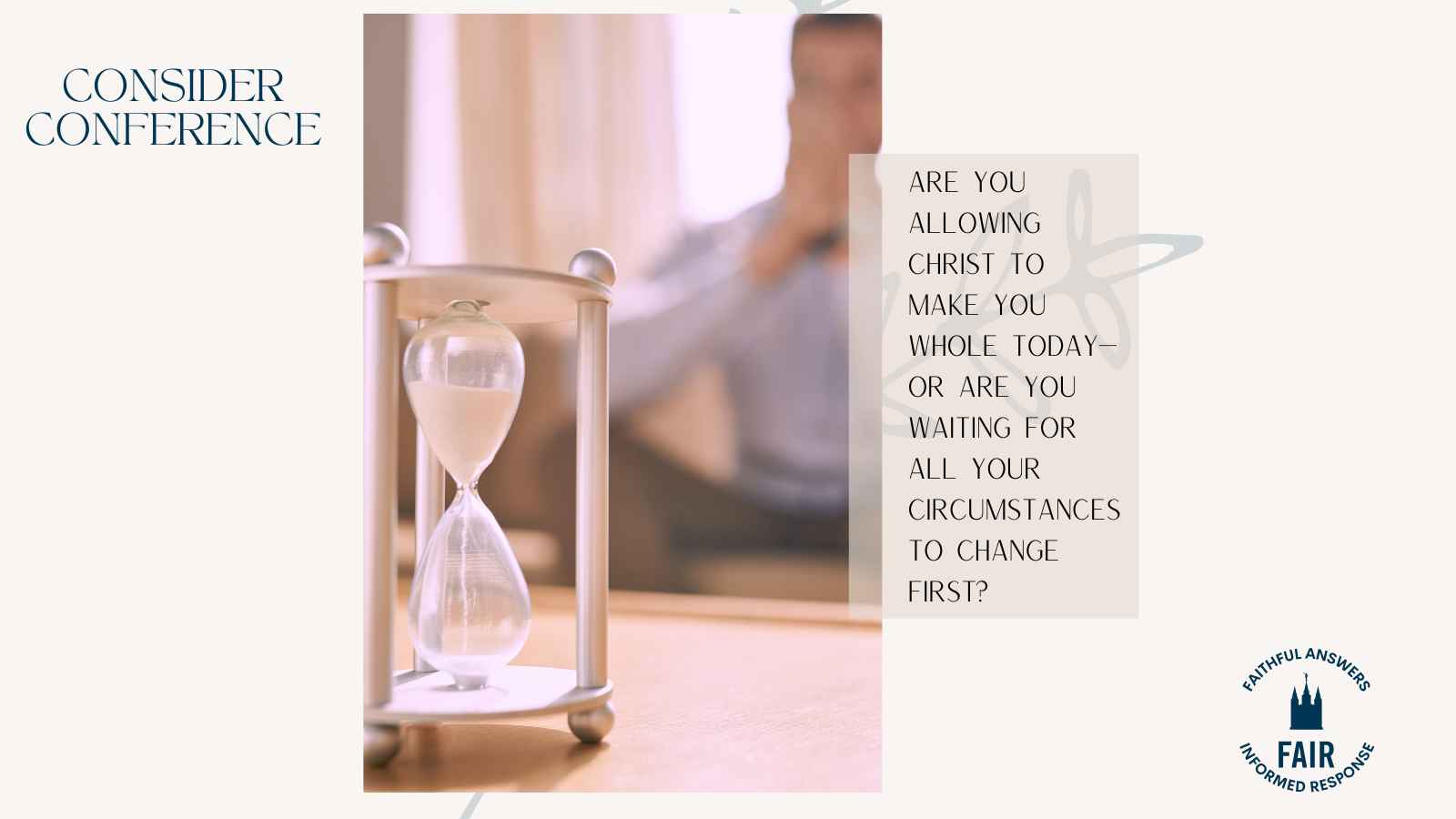
“Wholeness is born of faith in and conversion to Jesus Christ.” — President Camille N. Johnson
The Consider Conference series by FAIR offers an in-depth look at recent General Conference talks to help members of the Church of Jesus Christ of Latter-day Saints navigate common questions, misunderstandings, and criticisms. Each post provides doctrinal insights, historical context, and practical ways to apply gospel principles in everyday conversations. Through this series, we hope to equip readers with faith-promoting resources that encourage thoughtful reflection, respectful dialogue, and a stronger foundation in gospel truths, fostering both personal conviction and meaningful discussions with others.
The post Spiritually Whole in Him appeared first on FAIR.
Continue reading at the original source →




